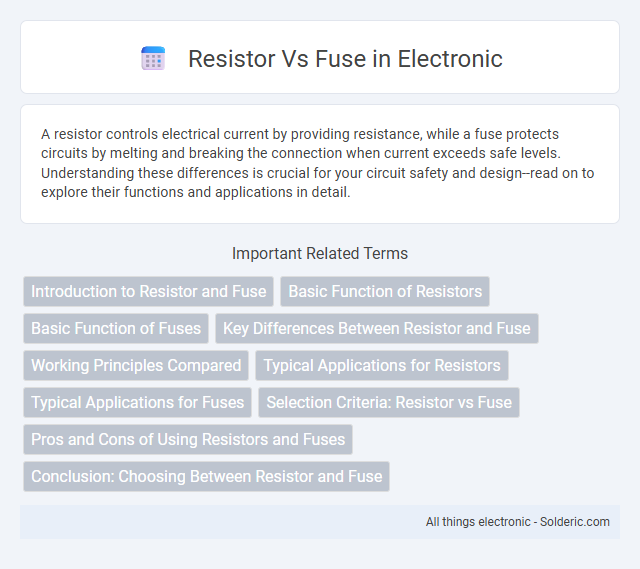A resistor controls electrical current by providing resistance, while a fuse protects circuits by melting and breaking the connection when current exceeds safe levels. Understanding these differences is crucial for your circuit safety and design--read on to explore their functions and applications in detail.
Comparison Table
| Feature | Resistor | Fuse |
|---|---|---|
| Primary Function | Limits electric current flow | Protects circuit by breaking current on overload |
| Operation | Dissipates electrical energy as heat | Melts or breaks when current exceeds rating |
| Reusability | Reusable | One-time use (needs replacement after blow) |
| Typical Use | Control voltage and current in circuits | Circuit protection against overcurrent and short circuits |
| Material | Carbon film, metal film, wirewound | Metal wire or strip sealed in casing |
| Response Time | Instantaneous (passive element) | Fast, depends on fuse rating (milliseconds to seconds) |
| Damage Impact | Can overheat, potentially damaging circuit | Safely disconnects circuit to prevent damage |
Introduction to Resistor and Fuse
Resistors control electrical current by providing a specific amount of resistance measured in ohms, ensuring circuit components receive appropriate voltage levels. Fuses act as safety devices that protect circuits from overcurrent by melting their internal wire when the current exceeds a designated amperage rating. Both components play crucial roles in electrical circuits, with resistors managing current flow and fuses preventing damage caused by electrical faults.
Basic Function of Resistors
Resistors regulate electrical current by providing precise resistance to control voltage and current levels within a circuit. Unlike fuses, which protect circuits by breaking the connection during excessive current flow, resistors maintain consistent performance by dissipating energy as heat without interrupting the circuit. Understanding the basic function of resistors helps you design stable and efficient electronic systems.
Basic Function of Fuses
Fuses serve as essential safety devices designed to protect electrical circuits by interrupting current flow when excessive current causes the fuse element to melt. Unlike resistors, which primarily control current by providing fixed resistance, fuses act as sacrificial components that prevent damage from short circuits and overloads. Understanding the basic function of fuses helps you safeguard your electrical system from potential hazards and equipment failure.
Key Differences Between Resistor and Fuse
A resistor controls electrical current by providing a specific resistance value in a circuit, often measured in ohms (O), while a fuse acts as a protective device that interrupts current flow when it exceeds a predetermined rating, preventing damage from overcurrent. Resistors dissipate electrical energy as heat and function continuously in normal operation, whereas fuses operate only once by melting their internal element to break the circuit during fault conditions. The primary application of resistors is current regulation and voltage division, while fuses are crucial for safety and protecting electrical components from short circuits and overloads.
Working Principles Compared
Resistors operate by limiting electrical current through a predictable resistance value, converting excess energy into heat to protect circuits from damage due to excessive current. Fuses function as safety devices designed to interrupt the circuit by melting their internal element when current exceeds a specific threshold, preventing potential hazards like fires or component damage. While resistors regulate current continuously, fuses provide a one-time protective cutoff in abnormal conditions.
Typical Applications for Resistors
Resistors are primarily used in electronic circuits to control current flow, divide voltages, and set biasing conditions for transistors. They play a crucial role in signal conditioning, filtering, and voltage regulation within devices like amplifiers, power supplies, and sensors. Unlike fuses that provide overcurrent protection, resistors ensure precise electrical performance and stability in a wide range of applications.
Typical Applications for Fuses
Fuses are commonly used in electrical circuits to protect against overcurrent conditions by breaking the circuit when the current exceeds a specific threshold. Typical applications for fuses include household appliances, automotive systems, and industrial machinery, where they prevent damage from short circuits and overloads. Your devices benefit from the reliable safety fuses provide, ensuring circuit integrity and preventing potential fire hazards.
Selection Criteria: Resistor vs Fuse
When selecting between a resistor and a fuse, consider their primary functions and application requirements: resistors regulate current flow and voltage levels, while fuses provide critical overcurrent protection by breaking the circuit when current exceeds a safe threshold. Your choice depends on whether you need continuous current control or safety interruption during fault conditions. Key selection criteria include the resistor's resistance value, power rating, tolerance, and the fuse's current rating, response time, and breaking capacity.
Pros and Cons of Using Resistors and Fuses
Resistors provide precise control over current flow, enabling voltage division and signal conditioning but are not designed to protect circuits from overcurrent damage and can generate heat under load. Fuses offer reliable overcurrent protection by breaking the circuit when current exceeds safe limits, preventing component damage and fire hazards; however, they require replacement after blowing and do not regulate current under normal operation. Selecting between resistors and fuses depends on whether the application prioritizes current regulation and signal control or circuit protection and safety.
Conclusion: Choosing Between Resistor and Fuse
Choosing between a resistor and a fuse depends on the specific electrical application requirements: resistors regulate current flow and dissipate energy as heat, providing controlled resistance within circuits, while fuses protect devices by breaking the circuit during overload or short-circuit conditions. For current limiting with energy dissipation, resistors are ideal, whereas fuses offer essential safety by preventing damage from excessive current. Selecting the appropriate component ensures circuit reliability and protection based on whether control or safety is the primary concern.
resistor vs fuse Infographic

 solderic.com
solderic.com